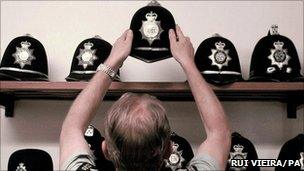Police and crime panels 'must have approval from AMs'
- Published

AMs have voted against part of legislation to create elected police commissioners
The Welsh assembly's presiding officer says the UK government will not be able to introduce police and crime panels in Wales without AMs voting in favour.
AMs voted against part of the legislation on elected police commissioners on Tuesday.
The Home Office called the vote "unwise" and said AMs had "cut off their noses to spite their faces".
But Presiding Officer Lord Dafydd Elis-Thomas said UK ministers would now have to "think again".
The UK government wants to replace police authorities with elected commissioners across England and Wales.
The Home Office sought the assembly's permission to introduce police and crime panels that will scrutinise the commissioners in Wales. The vote was held because the changes would affect local government, which is devolved.
AMs voted to refuse their consent in the Senedd on Tuesday, the first time such a move has happened on Westminster legislation.
Policing Minister Nick Herbert reacted angrily, saying he would push ahead with his plans for elected commissioners anyway. But Mr Herbert said that "agreed arrangements for Wales, which gave a role for the Welsh Assembly Government, cannot now apply".
Mr Herbert wrote to AMs on Monday, urging them to vote in favour of the so-called legislative consent motion. He said he was concerned there may be some misunderstanding about the motion and insisted it was not a vote on the merits of commissioners.
But Lord Elis-Thomas told BBC Wales: "They cannot now legislate in the way they sought to do, because the responsibility for local government lies with the local government minister here and the competence is with the national assembly - that is the meaning of devolution.
"Legislative consent motions are there to make it work, in other words, when Westminster wants to legislate in areas which are the responsibility of this place, then we have to give our consent, and the assembly members yesterday refused to do that.
"And therefore, the minister has to think again. It's very simple".
Lord Elis-Thomas added that it was important that the "respect agenda" between the UK government and Wales was observed.
"The assembly refuses its consent to something Westminster wants, as part of the constitution, and yet they seem to say they will carry on regardless. There's not very much respect there, is there?"
He said that from his meetings with chief constables and police authorities as an AM, the assembly was reflecting their views in a democratic way.
The four Welsh chief constables last year questioned the need for elected commissioners.
The presiding officer added: "I know that what the assembly decided is in line with the views of the practitioners in Wales, so therefore the assembly decision is a democratic decision."
Responding to the vote, Mr Herbert said: "This wasn't a vote on police and crime commissioners because the House of Commons has already decided to introduce them in England and Wales.
"It was a vote to ensure that special arrangements could apply in Wales.
'Absolutely ridiculous'
"By unwisely voting against the motion, I regret that some assembly members have cut off their noses to spite their faces, so that these agreed arrangements for Wales, which gave a role for the Welsh Assembly Government, cannot now apply.
"Police and crime commissioners will go ahead, ensuring that the people in Wales have a real say over how their communities are policed."
The assembly government, which is opposed to replacing police authorities with directly-elected commissioners, said it would inform the Home Office of the assembly's decision.
Speaking on BBC Wales' AMPM programme, Conservative AM Darren Millar said: "We've got a criminal justice system which isn't devolved, policing that isn't devolved, yet the local government minister here, because he has certain functions, is able to stop this progress being made here in Wales.
"I think that's absolutely ridiculous. Quite frankly, delaying the progress that needs to be made on policing is a farce."
- Published22 September 2010
- Published26 July 2010